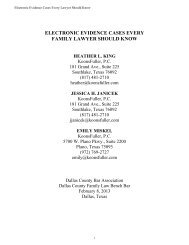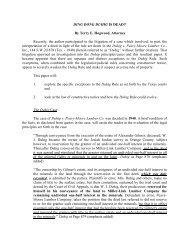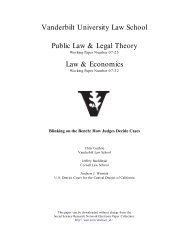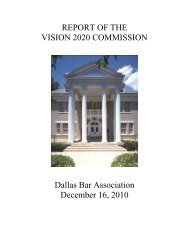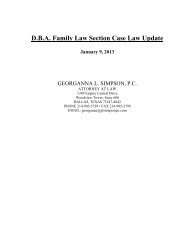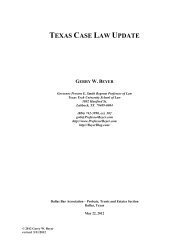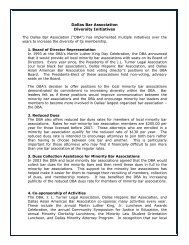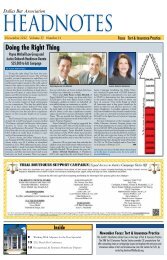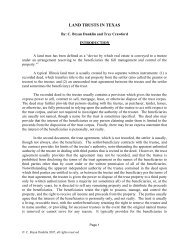Thursday, September 29 , 2011 Tiffany Caldwell v. State, Tonya ...
Thursday, September 29 , 2011 Tiffany Caldwell v. State, Tonya ...
Thursday, September 29 , 2011 Tiffany Caldwell v. State, Tonya ...
You also want an ePaper? Increase the reach of your titles
YUMPU automatically turns print PDFs into web optimized ePapers that Google loves.
<strong>Thursday</strong>, <strong>September</strong> <strong>29</strong> th , <strong>2011</strong><br />
<strong>Tiffany</strong> <strong>Caldwell</strong> v. <strong>State</strong>, <strong>Tonya</strong> <strong>Caldwell</strong> v. <strong>State</strong>, and Connie <strong>Caldwell</strong> v. <strong>State</strong><br />
Cause Nos. 05-10-01669-CR, 05-10-01670-CR, and 05-10-01671-CR<br />
Fifth District Court of Appeals<br />
Teaching Materials/Case Summary<br />
The Facts.……….…………………………………………………………………………………2<br />
The Trial Court Proceeding.………………………………………………………………………2<br />
The Appeal……………….………………………………………………………………………..2<br />
The Attorneys…………….………………………………………………………………………..2<br />
The Oral Argument………………………………………………………………………………..3<br />
Fifth District Court of Appeals……………………………………………………………………3<br />
The Legal Standard………………………………………………………………………………..3<br />
The Disputed Issues……………………………………………………………………………….3<br />
The Decision and Opinions……………………………………………………………………….4<br />
Questions and Additional Information…………………………………………………………..4
The Facts<br />
Child Protective Services (CPS) wished to investigate the welfare of children living in a<br />
house reportedly used in manufacturing drugs. CPS requested that the police go to the house<br />
along with the CPS caseworker in order to ensure the caseworker’s safety. Several police<br />
officers went to the house and when they arrived, they knocked on the door. A young child<br />
answered, and she said, “Come in.” As the officers entered the house, the girl turned around and<br />
said, “It’s the police.” The officers saw a man sitting at the kitchen table. He appeared nervous<br />
and claimed that he did not live in the house. According to one of the officers, the man claimed<br />
that no one else was in the house. However, two women came out of the back room, and the<br />
officers testified that they heard a toilet flush. A third woman came out of the bathroom. The<br />
officers then searched the house and found drugs. Prior to their initial search, the police did not<br />
have a search warrant.<br />
The three women in the house were <strong>Tonya</strong> <strong>Caldwell</strong>, <strong>Tiffany</strong> <strong>Caldwell</strong>, and Connie<br />
<strong>Caldwell</strong>. <strong>Tonya</strong> and <strong>Tiffany</strong> <strong>Caldwell</strong> were indicted for criminally negligent child<br />
abandonment and endangerment. Connie <strong>Caldwell</strong> was indicted on drug charges.<br />
The Trial Court Proceeding<br />
The <strong>Caldwell</strong>s contend that the police conducted an unconstitutional search of the house.<br />
In particular, they argue that the police did not have the authority to enter the house and then<br />
conduct the search. In the trial court, <strong>Tonya</strong> <strong>Caldwell</strong> filed a motion to suppress the evidence<br />
that was obtained during the search. The trial court judge denied the motion. All of the<br />
<strong>Caldwell</strong>s then pled guilty to the various crimes with which they were charged.<br />
The Appeal<br />
<strong>Tonya</strong> <strong>Caldwell</strong> appeals the trial court’s denial of her motion to suppress. She argues that<br />
the police search was unconstitutional and that the drugs found during the search cannot be used<br />
as evidence against her. She asks the appellate court to reverse the trial court’s decision on her<br />
motion. Although the trial court record does not indicate that they filed their own motions to<br />
suppress, <strong>Tiffany</strong> and Connie <strong>Caldwell</strong> also argue that the search was unconstitutional and the<br />
drugs cannot be used as evidence against them.<br />
The appeal will be heard by the Fifth District Court of Appeals of Texas. Because the<br />
<strong>Caldwell</strong>s are appealing the trial court’s decision, they are the “Appellants.” The <strong>State</strong> of Texas,<br />
which prevailed in the trial court, is the “Appellee.” After the appeal was filed, the <strong>Caldwell</strong>s<br />
submitted a legal document called a “brief,” describing the legal arguments in support of their<br />
position. The <strong>State</strong> also submitted a brief addressing the issues raised by Appellants.<br />
The Attorneys<br />
Each party is represented by experienced attorneys. The attorneys prepared the briefs and<br />
will present the parties' arguments to the appellate court. The <strong>Caldwell</strong>s (Appellants) are<br />
represented on appeal by Larry Finstrom of Dallas, Texas. The <strong>State</strong> (Appellee) is represented<br />
by Michael McLelland, Kaufman County Criminal District Attorney, and Sue Korioth, Assistant<br />
Criminal District Attorney for Kaufman County.
The Oral Argument<br />
The Fifth District Court of Appeals will hear this appeal on <strong>September</strong> <strong>29</strong>, <strong>2011</strong>, at the<br />
Belo Mansion in Dallas. The Appellants and the Appellee will each have twenty minutes to<br />
address the court. During this time, the attorneys will present their arguments, and the judges<br />
will ask questions regarding the case and applicable law. The Appellants’ lawyer will argue<br />
first, followed by the Appellee’s lawyer. Once the Appellee’s attorney has concluded its<br />
arguments, the Appellants’ attorney will have five more minutes for a final rebuttal argument.<br />
Fifth District Court of Appeals<br />
The Fifth District Court of Appeals is an intermediary court, which hears both civil and<br />
criminal cases and has jurisdiction over appeals from both district and county courts located in<br />
Dallas, Collin, Grayson, Hunt, Rockwall, and Kaufman Counties. The court consists of a Chief<br />
Justice and twelve other judges, all of whom are elected and hold their offices for terms of four<br />
years. Ordinarily, three judges will preside over oral arguments. After an oral argument, the<br />
judges will review the briefs and the trial record. After they have fully considered the case, the<br />
three judges will vote and decide the outcome of the case. For a panel of three to reach a final<br />
decision, two of the three judges must agree. Decisions issued by the Fifth District Court of<br />
Appeals can be appealed to either the Texas Supreme Court, which hears only civil cases, or the<br />
Texas Court of Criminal Appeals, which hears only criminal cases. To learn more about the Fifth<br />
District Court of Appeals, visit http://www.5thcoa.courts.state.tx.us/.<br />
The Legal Standard<br />
The Fifth District Court of Appeals reviews decisions of trial courts. The Court of<br />
Appeals does not preside over trials, and no new witnesses or evidence can be introduced during<br />
an appeal. The appellate court’s role is to review the trial court’s record to see if any legal errors<br />
occurred. The record includes the transcripts from the trial, including the jury selection process,<br />
and all evidence that was introduced during the trial. In this case, the Court of Appeals will<br />
review the trial court’s decision for abuse of discretion. The Court of Appeals generally will<br />
accept the trial court’s findings of fact.<br />
The Disputed Issues<br />
I. Did the trial court abuse its discretion by denying the motion to suppress<br />
evidence that was purportedly found in violation of the United <strong>State</strong>s<br />
Constitution<br />
The <strong>Caldwell</strong>s contend that the police searched the house in violation of the Fourth<br />
Amendment to the United <strong>State</strong>s Constitution. The Constitution protects citizens against<br />
unreasonable searches and seizures. Absent exigent circumstances, the police generally cannot<br />
conduct a search unless they first obtain a search warrant or obtain consent from someone who<br />
has authority to give it. The <strong>Caldwell</strong>s argue that the child who answered the door could not<br />
give valid consent for the police to enter the house. Additionally, the <strong>Caldwell</strong>s claim that once
inside, the police should not have searched the house without a search warrant. As a result, the<br />
<strong>Caldwell</strong>s argue that the drugs found in the house could not be used as evidence against them.<br />
The Appellee responds that the <strong>Caldwell</strong>s are not in a position to object to the search<br />
because it is not clear from the testimony before the trial court that any of the <strong>Caldwell</strong>s owned<br />
the house that was searched or that they lived there. The Appellee also argues that the police had<br />
the authority to enter the house because the child gave them permission to do so, and the man<br />
sitting in the kitchen did not object. Once inside, the police had the authority to search the house<br />
to ensure their own safety and that of the CPS caseworker. The police had reason to suspect that<br />
the house was unsafe because it was reportedly used in manufacturing drugs, the man in the<br />
kitchen behaved suspiciously, and the police heard a toilet flush, which is a common way to<br />
quickly dispose of drugs. The Appellee further argues that the case against the <strong>Caldwell</strong>s does<br />
not rest on the drugs found during the initial search of the house.<br />
II.<br />
Can the Court of Appeals hear the appeals of <strong>Tiffany</strong> and Connie <strong>Caldwell</strong>,<br />
despite the fact that there is no record that they themselves filed motions to<br />
suppress<br />
Generally, in order for an appellate court to consider a motion to suppress, the motion<br />
must first be filed in the trial court. The trial court record does not reflect that <strong>Tiffany</strong> and<br />
Connie <strong>Caldwell</strong> filed a motion to suppress similar to the one filed by <strong>Tonya</strong> <strong>Caldwell</strong>. This<br />
raises the issue of whether <strong>Tiffany</strong> and Connie <strong>Caldwell</strong>’s objections to the search of the house<br />
have been preserved for appeal. The <strong>Caldwell</strong>s argue that <strong>Tonya</strong> <strong>Caldwell</strong>’s motion to suppress<br />
is sufficient to allow the Fifth District Court of Appeals to hear their claims. The Appllee<br />
responds that the Court of Appeals cannot entertain <strong>Tiffany</strong> and Connie <strong>Caldwell</strong>’s appeals.<br />
The Decision and the Opinions<br />
After the attorneys present their oral arguments, the Fifth District Court of Appeals may<br />
take several weeks or months to decide the appeal. The Fifth District Court of Appeals’ decision<br />
and any opinions written by the judges will be made available for review at<br />
http://www.dallasbar.org/appealing/. In addition, the opinions can be accessed using the case<br />
numbers (05-10-01669-CR, 05-10-01670-CR, and 05-10-01671-CR) at<br />
http://www.5thcoa.courts.state.tx.us/search_c.htm. It is also possible to register your email<br />
address for updates on the cases. To register, go to http://courtstuff.net/5th/Register.html. You<br />
will need to register with the court’s vNotice! system first and then send emails to<br />
caseinfo@courtstuff.com with “Subscribe 05-10-01669-CR,” “Subscribe 05-10-01670-CR,” and<br />
“Subscribe 05-10-01771-CR” in the subject lines. For more detailed instructions on this process,<br />
go to http://www.5thcoa.courts.state.tx.us/vNotice.htm.



